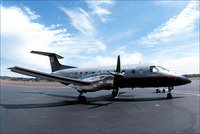This is the first of three planned posts on my trip back into my old stompin' grounds. This day long road trip was a week ago today.
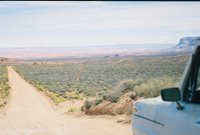
We arrive in Escalante a little before noon. This has to be one of the strangest towns in Utah. A few years ago the Mormon influence was so strong you had a hard time finding 3.2 beer, yet interestingly the town isn’t named after a saint, but a Catholic priest. Father Escalante came through here a century before the Mormons settled this area, in search of a faster way from Santa Fe to the California missions. At that time only a few small bands of Paiutes lived in this hostile environment, descendants of the Anasazi whose culture flourished here until abruptly disappearing around 700 years ago. As Escalante discovered, travel in canyon country is difficult. It’s easier today, but by modern standards is still difficult.
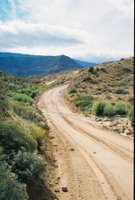
I haven’t been in Escalante for five or six years. The town appears prosperous; almost as if negating the doom predictions of the naysayers that predicted President Clinton’s creation of the Grand Staircase National Monument would be a catastrophic event. The town now has sidewalks with classic street lamps, several new businesses and a new high school. R and I pull up in front of the Golden Loop, a diner. The logo has a cowboy standing tall in the saddle, with the “golden loop” of his lasso falling over the neck of a calf. It’s not quite noon, so we hit the Roan Pony Bookstore next door first. I know right away things have changed.
“Don’t sell too many books to locals, do you?” I say to the sales clerk.
“We sell a few children books,” she replies, “but not many for adults.”
“I bet not,” I say while reading through the titles of books critical of the Mormon faith. She has a couple copies of Fran Brodie, No Man Knows My History. It’s a good biography of Joseph Smith, the faith’s founding prophet, and written by a granddaughter of Brigham Young, the faith’s second prophet. It’s been fifty years since this book was first published. Its publication got Brodie excommunicated and the book placed on the church’s blacklist. There are other books critical of the Mormon Church including a few titles by people who have left the church, encouraging others to follow in their footsteps. In another section of the small store are the works by Michael Moore, Calvin Tillian, Al Franklen, and others critical of Bush and Republicans. There’s even a copy of articles of impeachment for Bush, or so its cover suggest. Not only is this Mormon country, this is Republican country and these titles won’t gain her any friends. And finally there’s a section reserved for environmental writers, Abbey and McPee and a host of others. This is country where the bumpers of pick-ups sport bumper stickers critical of environmentalists and nature lovers. “Hungry: Eat an Environmentalist,” reads one. It’s pretty obvious to me that the Roan Pony isn’t marketing itself to the locals, but there are now plenty of tourists flocking to see this rugged country. I admire the owner. She’s a brave soul. Just having this bookstore in Escalante is akin to Jeremiah of the Old Testament standing up and telling King Zedekiah and his court what they didn’t want to hear. Of course, Jeremiah got thrown into a well.
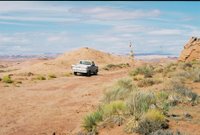
The Roan Pony is having a 20% off sale. She’s getting ready to close up for winter in a few weeks. I pick up a book that’s been on my reading list, Paul Theroux Dark Star Safari, figuring with a 20% markdown, I can support the local economy.
After the bookstore, we enter the restaurant and sit at a table. It takes a few minutes for the waitress to get to us. I order a hamburger and ice tea, R asks for chili and coffee. After a few minutes more she brings out drinks. Then the waiting starts. After a good fifteen minutes, after I’ve finished my tea and he’s drunk his coffee, R quips: “If they keep up at this pace, we can make it dinner.” Not very happy at the service, I nod in agreement, saying something about them having to catch a cow before they can butcher it. But then the meal comes and the burger is tasty. This isn’t any corn fattened cow, its range fed and you can taste the difference.
As we’re finishing up with lunch, R tells me the problem he’s been having with the lights on the truck. He can’t remember if he got ‘em fixed. I’m sure there was a speck of horror on my face. R doesn’t use this truck much anymore, but he’s always keeps it in good running order. Seeing that we’ve lost an hour between the bookstore and diner, and there is little chance we’ll get back before evening, I heartily agree that we should check the lights out before we leave town. They work! R gives me the key and asks me to drive. As I maneuver out into the street, I ask if we should top off the tank. He doesn’t think so since he’s got a reserve tank of 18 gallons. We have plenty of snacks and water, just in case. We leave the town and civilization behind.
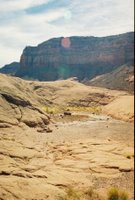
Just out of Escalante, we take the graveled “Hole in a Rock Road,” that runs southwest. Its fifty-four miles from the point you leave the pavement until the trail dead-ends on an overlook at the Colorado River. In the 19th Century, Mormons used this road to migrate into the Arizona Territory. It was a long and punishing trip. Once they got to the “Hole in a Rock,” an opening in the mountains above the Colorado, they lowered their wagons with ropes down to the ford in the river. The ford is gone; the Glen Canyon dam has flooded this part of the river to create Lake Powell.
To the right of the road is a band of imposing cliffs, with bands of sediment running nearly the fifty miles, like chevrons. To the left, the country drops off into canyons that lead down into the Escalante River. There are a few signs noting points of interest along the way. There are also a handful of mileage signs which aren’t consistent. After ten miles on the road, a sign says its 51 miles to the end. Then, after only a mile, another sign says its 42 miles, which is about what we expect. Yet, just a few miles beyond that sign, another one says we got 46 more miles. “You going backwards, R asks? We don’t put any confidence into the signs.
The first thirty miles of the road is fairly good; or as good as gravel roads go. This is high desert country; as far as one can see there are pinion and juniper trees, yellow rabbit brush, and sage. Just off the road, to the west, are acres of unique rock formations known as the Devil’s Garden. Large beige columns of mushroom like sandstone cover the area. Afterwards, the road continues to lose elevation and fewer and fewer trees are seen until somewhere under 4500 feet, they become non-existent. There are flowers: Orange Mellow, Sego Lilies, Snakeweed. It’s a pleasant surprise to find so many flowers blooming this late in the season, but the area has recently had rain as evident by the muddy bottoms in the ravines. Yucca plants are also prevalent, their spring blooms long dried by the sun and wind. Cottonwoods grow only in a few washes, an indication of water in this barren land.
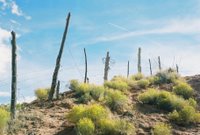
As we begin to get closer to the end, the cliffs and the canyons draw closer and the road snakes down into washes, only to wind steeply out of them. Driving is a challenge. The truck has no power steering and I fight with the wheel while constantly downshifts, to keep from burning out the brakes. On a few occasions, I even have to double clutch the truck into low, to get enough power to climb a steep embankment. We’re swung around at every bend and I recall the chase seen across slickrock in Edward Abbey’s
Monkey Wrench Gang. But we’re not being chased by the Sheriff out of Moab, so I slow down.
It’s getting later in the afternoon and we both begin to worry about getting back to the pavement before nightfall. Around 4 PM, after having covered maybe 2 miles in the past thirty minutes, we give up. We’re at least 4 miles from the “hole.” I was willing to continue, but I’d been there about 10 years earlier. R had never been out this far, but after swearing that it’s the worst road he’s ever been on, suggests we turn around.
Coming out goes faster than going in even though we’re driving into a north wind blowing sand down the road. Whenever we stop and get out, the sand stings my bear legs. As the sun drops closer to the Kaiparowits Plateau, we have one final adventure. I tell Ralph we’re low on fuel in the main tank and he instructs me on how to change tanks. I do and a minute or so later, the truck runs out of fuel. We return to the main tank and then try it again. Something is wrong with the switch. I go back to the main tank and drive cautiously as the needle pegs empty. I let out a sigh of relief when we get back to blacktop. A few minutes later, we’re back in Escalante at a gas station. There’s less than half a gallon in the tank. Had we continued on to the hole in a rock, we’d been out of gas in the main tank and would have to figure out how to siphon gas from one tank to another (without a hose).
Once back on the highway, I watch the stars appear as we head west, arriving back at R’s home in time for a late but wonderful dinner of short ribs, prepared by R's wife.







